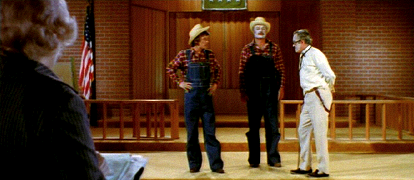Director: L.Q. Jones
Writers: L.Q. Jones, Wayne Cruseturner (uncredited), adapting Harlan Ellison’s novella
Producers: L.Q. Jones, Alvy Moore
Cast: Don Johnson, Tiger (uncredited as the dog Blood), Tim McIntire (Blood’s voice), Jason Robards, Susanne Benton, Alvy Moore, Helene Winston, Hal Baylor, Charles McGraw, Hal Baylor, Ron Feinberg, Michael Rupert, Don Carter, Michael Hershman, (and uncredited cast members) Dickie Jones, L.Q. Jones, Maggie Smith
The world has been devastated by nuclear war. Humanity has devolved into barbarism. Teenager Vic (Don Johnson) and his dog Blood (Tiger, voiced by Tim McIntire) are partners in a nomadic existence of stealth and violence taking the food and supplies that they can scavenge from the remains of civilization. Blood is no ordinary pet. The dog has developed human-level intelligence and a telepathic bond with Vic. These two make a formidable and deadly team when encountering opposing scavengers that they must compete with to survive. Vic is under surveillance by an underground society that thinks the virile young man can be of use to them.
The Flashback Fanatic movie review
A Boy and His Dog is certainly a cult movie. It has an eccentric blend of science fiction and humor that never dispels the dread about the aftermath of nuclear war. It manages to be exciting, funny, thought-provoking, and, ultimately, very grim. This precarious mix of reactions to the story results in a unique experience that may reward some viewers and frustrate others. It is not that there is anything difficult to follow in the story. The uneasy feeling the film leaves one with is that nuclear war is not only awful, but surviving it is not a worthwhile option.
This is another great example of the interesting science fiction films that were appearing in the 1970s before George Lucas’ Star Wars (1977) defined the genre for the mainstream as nothing more than effects-driven fantasies about action instead of speculative concepts about consequences.
A Boy and His Dog is also a film that its director L.Q. Jones suggests began the post-apocalyptic movie genre. This probably influenced director George Miller to use the collapse of civilization to set the stage for barbaric conflict and high-speed vehicle action in Mad Max (1979) and its sequels. Like George Lucas, Miller stressed action over ideas.
Amidst the very unpleasant environment of A Boy and His Dog, we are dealing with the amoral survivalist mentality of the two main protagonists and partners in the story, Vic and Blood. They are the characters that make this a great science fiction film. They are interesting and engage our emotions while never comforting our civilized sensibilities. They demonstrate how the survivors are conditioned by the complete destruction of civilization wrought by nuclear war. Science fiction only matters when it explores an imagined phenomenon’s effect on people.
In this early film role, Don Johnson is very good as Vic, the daring, young man that steals and kills to survive. He is reckless, ruthless, and believable as a teenager hardened by the cruel times he endures, but he still has a young man’s drives and volatility.
Fortunately, Vic’s partner Blood is a dog that has somehow acquired more learning and intelligence than the savage humans of this post-apocalyptic world. Blood also has a telepathic ability to share thoughts with Vic. Just how the dog developed such abilities is never explained, but we could assume that he is the result of some sort of mutation. In sci-fi flicks, radiation can play all sorts of tricks.
The character of Blood is the most memorable thing about the film. This is a remarkable performance by the canine actor Tiger and Tim McIntire providing the voice for Blood’s telepathic thoughts. It is very funny to see that while Blood possesses superior intelligence and often belittles his human companion, he still engages in typical canine behavior trying to beg popcorn from a patron at a ramshackle approximation of a movie theater.
While Vic and Blood are pragmatic about everything that they need to do to survive in a world without laws and dwindling resources, they also have a bond of loyalty to each other. They need each other to survive. However, this does not mean that they don’t frequently bicker about conflicts of interest. These exchanges are often very funny, as Blood’s telepathic bark is often worse than his bite. As the brains of the partnership, Blood tries to teach Vic history, proper grammar, and insults him for his impulsive and risky behavior. Their main point of contention is due to Vic’s libido. Blood is very good at sensing the presence of women for his horny partner to use, but that is likely to prompt Vic into taking dangerous chances.
When Blood spots Quilla June Holmes (Susanne Benton) for Vic, the bond between the boy and his dog is threatened. She is a different kind of girl than Vic has ever known. She is from a society “down under” and she does not resist Vic. The repetitive consensual sex she has with the randy, young man has him hooked. When Quilla June escapes Vic, he follows her into the underground facility that is her home called Topeka.
This subterranean alternative to the dirt and devastation above is a grotesque and stifling caricature of “traditional” American small town culture. The director of the town’s committee, Lou Craddock, is played with a listless wit by Jason Robards. He is in charge of a culture so regimented in its rules and etiquette that any deviation from complete conformity is viewed as a threat to this isolated settlement’s social structure. This is an important aspect to the story. It supposes that as man strives to survive nuclear holocaust, there can be dystopias created that are unpleasant in different ways than the total lack of law and order.
According to director Jones, A Boy and His Dog was offensive to feminist sensibilities of the 1970s. Then, as the movie continued to be distributed and shown at various theaters into the 1980s, the reception by women became much more positive. The famed fantasy author of the original novella, Harlan Ellison, actually approved of the film, but he hated the last line of the picture. It is certainly a memorable line, yet I also see how it may not only be seen as misogynistic, but damages the respect we may have for characters we have invested our feelings in. However, I think it is still consistent with those characters’ behavior throughout the story. Something to bear in mind is that it helps to stress just how unsentimental the survivalist mentality of a post-apocalyptic world could become. Dog or no dog, it won’t be warm and fuzzy.


















I never got around to seeing this, but I always wanted to. The ending has been discussed so many times that it won't be a surprise. Still, I'm intrigued by it. It always amazed me that Alvy Moore was involved in making this!!
ReplyDeleteWith this film's director L.Q.Jones, Alvy Moore also produced and acted in the fright flicks THE WITCHMAKER (1969) and THE BROTHERHOOD OF SATAN (1971). Moore had come a long way from GREEN ACRES.
ReplyDelete